by Jenny Rose | Jan 28, 2023 | Emotional Intelligence, Feelings
As I write this, I have just returned from a long journey across the country and into my past. I’m home again, but the journey is not over and I expect to retrace my steps back and forth for some undetermined length of time.
The physical journey, however long, is nothing to the internal journey I’ve undertaken through my memories, family dynamics and history, and so much of what has shaped my life and experience.
Before I left, I came across this poem by David Whyte:
Here in the Mountains
There is one memory deep inside you.
In the dark country of your life
it is a small fire burning forever.
Even after all these years
of neglect
the embers of what you have
known rest contented
in their own warmth.
Here in the mountains,
tell me all the things
you have not loved.
Their shadows will tell you
they have not gone,
they became this night
from which you drew away in fear.
Though at the trail’s end,
your heart stammers
with grief and regret,
in this
final night
you will lean down at last
and breathe again on the
small campfire of your
only becoming.
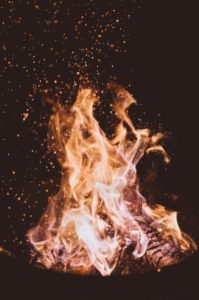
Photo by Joshua Newton on Unsplash
“Tell me all the things you have not loved.” This is an invitation I’ve never heard before. My focus has been on gratitude, on reframing, and on finding something good in every situation. I call myself a pessimist rather than an optimist, though I do leave windows and doors open for good things to happen while preparing for the worst.
My friends and I talk at work about the way we avoid “complaining.” A male coworker was taught as a child to refuse to give way to pain and illness, to work through it silently and privately without “complaint.” Is complaint the same as acknowledgment? I’m not sure. Three of us, all women, are more comfortable acknowledging our struggles and distress than our male friend, but none of us want to hear ourselves “whining.” Is whining the same as acknowledgment? I’m not sure about that one, either.
Because of my own confusion and blurriness around the terms we use and the cultural pressure towards toxic positivity, speaking about the things we have not loved is a jarring proposal. I carried it as I traveled on cars and buses, airport shuttles and airplanes. I hardly wrote at all over the last week. One journal entry by hand on the plane and the rest of my notebook filled with to-do lists, notes, names and numbers.
But I thought about things I have not loved.
It’s not just the invitation, though. It’s the way Whyte suggests all the things we have not loved are the background against which our lives are pinned, the shadows defining the light. I think of the night sky, gleaming with stars. What would the stars be without the blackness around them? I think of candle flames, fireflies, a lone campfire in the wilderness in the black night.

Photo by Jeremy Thomas on Unsplash
And isn’t it true that the things we have not loved don’t go away? Don’t they stay with us more inexorably, in fact, than the things we have loved? It seems so to me. Thus the fear, the drawing away, the heart filled with grief and regret. But at the core of our lives perhaps there is a small fire, patiently burning, waiting for us to come to our trail’s end. I think some would call the small fire God.
I realize one of the largest things I have not loved is love. A strange thing to realize, and a strange thing to say, I know. But so often my love has been helpless. The strong bonds, history, and feeling (all of which I mean by “love”) I feel for my parents, my brother, and my sons have been the greatest sources of pain in my life. Five vast, dark, wildernesses surrounding five campfires, these five who are flesh of my flesh, blood of my blood. These five who I could never stop loving, even if I wanted to. No matter how great the shadows around the fires, the flames burn, warm, beautiful, cleansing, regenerative. Often, I wish I could stand just outside the firelight, unseen, and simply love without fear, without pain, without wishing to be loved in return. But I do draw away in fear from the heat, the flame, the passion of the fire. I cherish the fires and would protect them with my life, but I fear them, too.
I have not loved the trauma and abuse that has shadowed what I love. I have not loved my disillusionment or the terrible choices I’ve made in building boundaries and learning to love myself. I have not loved my feelings of loss, insecurity, scarcity, and exile. I have not loved my pain and grief. I have not loved learning to let go.
I did not love walking into my mother’s home, the place where she has lived her self-imposed solitary journey into dementia and inability to care for herself. I did not want to follow her trail into the darkness of fear and denial, marked with soiled clothing and bedding, desperate and increasingly nonsensical and illegible notes and reminders. I did not want to go through drawers and cupboards of vitamins and supplements; over-the-counter remedies for pain, sleep, memory loss, skin problems and digestion issues. I did not want to fill trash bags with worn-out but never discarded clothing and shoes, a thousand used emery boards, outdated products and food.
I did not love going through every stitch of her clothing, sorting, washing, labeling with a laundry marker and packing it all to take to her new home in a memory care unit. The day after I carefully loaded her dresser, newly cleaned and placed in her room, we visited and found she had dumped every drawer into her laundry basket. She was “packing” to go home.
I did not love doing any of it. I did not want to do it. It broke my heart and filled me with futile guilt and shame. But at the center of every bag of trash, every bag and box to be donated, every clean drawer and cupboard, burned the small fire of my love for my mother. Inescapable. Inexorable. In a strange way, all the things I did not love were fuel to keep that fire burning. The more shadows I found under beds, in closet corners, in drawers and cupboards she forgot she had, the brighter the fire burned. My pain and pity, my anger with her lifelong pattern of denial and rejection of any help or support, made the fire burn higher. To tend the fire is to face the darkness.
And I would not have the fire go out, though I feel torn into pieces by its presence.
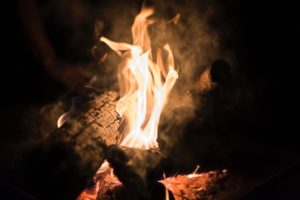
Photo by Josh Howard on Unsplash
It’s been a dark week, a week of deliberately moving into the things I have not loved. Drawing back was not an option. I could only step into the void. But the darkness has held a thousand small flames. The faces of old friends, both mine and Mom’s. Her animals, once so beloved but now forgotten by her, rehomed and doing well. A hundred acts of kindness and generosity. Help with moving furnishings into her new room. A cherry pie. Hugs and tears. The good-hearted friendliness of dogs. Constant support. Texts, emails, phone calls – all messages of succor and sympathy for me and my brother, for Mom. The friend who cares for the plants. The friends who keep an eye on the house. The friend who took a load to Goodwill for me. The friend who will take out the mountain of trash in the garage. And, when I came home, the arms of the friends who welcomed me back.
The shadows and the light. The things I have not loved cradle the things I do love. I am so weary I cannot begin to unravel the paradox. Perhaps it cannot be unraveled, only accepted and experienced. Perhaps Mom is wandering in her own dark wilderness, seeking the small campfire of her becoming, and when she finds it, leans down to breathe upon it, she will at last know peace.
Questions:
- Share three things you have not loved.
- Do things you have not loved persist in your life? What creates a background for what you do love?
- What is the difference between complaining (whining) and acknowledgment? Do you believe it’s wrong for you to admit to personal struggles?
To read my fiction, serially published free every week, go here: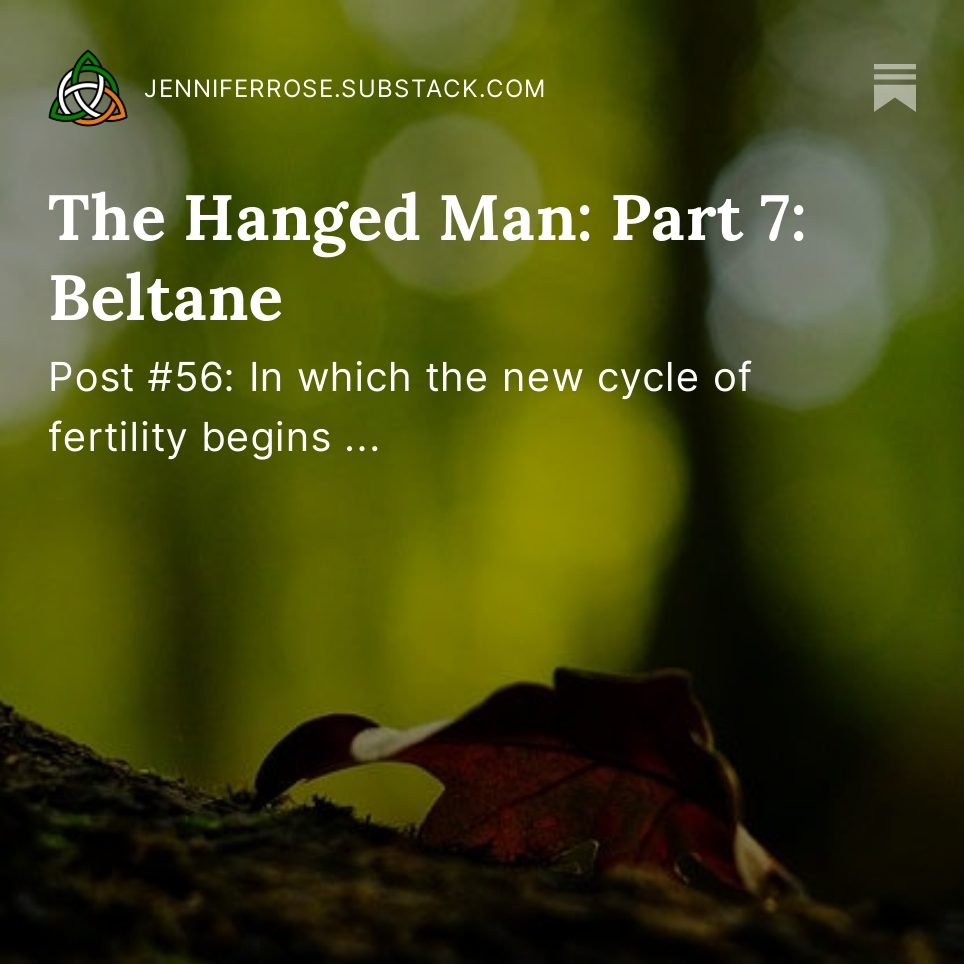
by Jenny Rose | Jan 14, 2023 | A Flourishing Woman, The Journey
When I am struggling, I frequently find myself gifted with exactly the idea I need to help me step back, take a breath, and reframe. It always feels like a miraculous bit of synchronicity. When it happens I remember to have faith in myself, faith in the vagaries of life. I remember I can make choices, whatever the situation.

Photo by NASA on Unsplash
It happened this morning, unexpectedly, in a post I read by an astrologist I follow. This astrologist is unlike any I’ve ever read before. To begin with he’s intelligent, but not in a grifter, let-me-manipulate-you sort of way. His interpretation of astrology is interesting and provocative. I don’t read him to find out what color to wear today, but because his lens is so fascinating.
This morning began at 4:00 a.m. Which is better than yesterday morning, which began at 3:00 a.m. with me hunched over in bed scribbling yet another list. Really important stuff that had to be recorded at three in the morning. For example:
- E birthday card for friend (We share the same birthday this week; clearly this was an urgent reminder.)
- request time off (formally, I mean. My absence is already covered by a teammate. But I might forget I have to travel to Colorado to put my mom in a memory care unit next week, and if I don’t properly request time off in our software system the sky will fall, I’ll be fired, I’ll give my director and friend (see above) extra work and she’ll hate me, I won’t get paid …)
- tape measure (We are visiting the facility we hope to check Mom into before going to her house. How will we know what furnishings to bring for her? How will we know how much wall space there is? Clearly, I need to pack a tape measure, carry it on the bus, on the hotel shuttle, on the plane, in the rental car. There are no tape measures in Colorado.)
- soap dish (We have an informal lost and found at the rehab pool facility where I work. Mostly what gets found are toiletries in the locker room and showers; these are rarely claimed. I need a soap dish, and one is sitting in our lost and found waiting to be retrieved. If no one comes to get it, I want that soap dish. A very important detail that must not be forgotten, as plastic soap dishes are rare and valuable. Soap dish or sleep? … obviously, soap dish is more important.)
- waterproof mattress cover (Mom’s new room will not accommodate a queen bed, which is the only size she has. We have a twin bed for her, but she’ll need new sheets and bedding. I mustn’t forget to get a couple of waterproof mattress covers …)
- Etc.
But where was I?
Oh, right, the astrologer’s post about Mars and planets and friction.
Friction. Pressure. Oh, boy.
I confess I didn’t read the whole article with much attention, mostly because I don’t have much focused attention right now for anything, but this caught my eye:
Mars Positive: Courage and willpower applied consciously towards a specific goal.
Mars Negative: Impatience and misapplied force.
Misapplied force, anyone? I had to laugh.
At that point it was time to get up and make breakfast, so I put the laptop aside. While I cooked, washed my face, cleaned out the cat boxes, and watched the cold dawn light I thought about friction. Pressure. Birth. Transformation. I thought about polished rocks and pearls. I thought about diamonds and fossils and geologic forces and time. I thought about youth and plasticity and vitality, followed by old age, desiccation, brittle bones, weariness, atrophy.

Photo by Josh Howard on Unsplash
Friction can produce fire — cleansing, regenerative, alchemical fire.
I remembered life is full of friction and grit. Experience can smooth our edges, soften our rigidities and certainties, blur our idealism and mellow our arrogance.
I remembered, in short, I can choose to avoid and resist friction (and mostly I do), but sometimes the only way out is through.
This is one of those times. A camel-through-the-eye-of-the-needle time. A time when the right thing to do is the thing I most want to avoid doing. A time when I want to argue with reality. A time when I have chosen and am now resigned to everything that choice entails.
In exactly a week from the minutes I sit writing this draft I’ll be on a plane heading to Colorado to do an unthinkable thing: meet my brother and one of my sons and transition my mother to a locked memory care unit in a place she’s never been before with people she doesn’t know (not that it matters, as she no longer remembers the places or the people she has known) before getting on another plane to come back to my life in Maine.
Even as I write it, it doesn’t seem real.
I wish it wasn’t real.
For the first time this morning, though, while the new day dawned and the cats and I ate our respective breakfasts, I thought about the other side of this narrow tunnel, this birth canal. There will be another side. There always is. What is happening to me, and to the rest of my family? What is happening, locked away, invisible, irretrievable, in Mom’s experience? I’ve done hospice work, and I’ve witnessed how mysterious and beautiful the end of life can be. This event ripples out into the rest of my family system, sanding, smoothing, transforming. Friction is change. Pressure reshapes us. Can I relax, just a little? Can I let it happen the way it needs to? Can I be satisfied I’ve made the choices and decisions I’ve needed to and let my feelings wash me where they will? Can I surrender to the cars, the buses, the hotel shuttles, the planes, the journey, in fact?
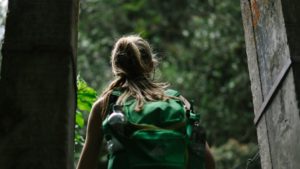
Photo by Dan Gold on Unsplash
Could I set aside soap dishes and birthday cards, payroll issues, tape measures, waterproof mattress covers; the potential for delays, bad weather, mechanical breakdowns, crowds, jammed traffic, overstimulation, viruses, and the general unpredictability of life and people and trust there will be sleep, there will be food, there will be a bathroom, there will be a minute to sit down, there will be help, there will be tears, and I will figure out how to print my boarding pass at a kiosk in the airport?
Well, I could try, at least. I’m willing to try.
There is friction, and friction is magical.
I’m publishing two weekends in a row right after I said I was moving to biweekly posting. But then the trip to Colorado was upon me, which is the weekend I’m scheduled to publish. So I’ll write again on the other side of all this friction. Maybe by then I’ll be a pearl. Or write pearls of wisdom?
Questons:
- What’s the biggest source of friction in your life? What is it shaping you into?
- What wakes you up at 3:00 in the morning?
- Do you avoid friction or welcome it?
- What helps you lubricate life’s friction?
Leave a comment below!
To read my fiction, serially published free every week, go here:
by Jenny Rose | Dec 24, 2022 | Connection & Community, Emotional Intelligence
I’m continuing to play with blind journaling. It’s most useful when I notice physical and emotional signs of anxiety and speeding but am not sure what’s triggered them. Taking off my glasses, turning off the light (I journal early in the morning while it’s still dark), and concentrating on feeling out the roots of my symptoms leads me to the source of my distress. Doing this when I first notice symptoms interrupts the spiral of anxiety that might otherwise follow and increase during the day.

Photo by Nicole Mason on Unsplash
It works much better than distraction, like playing solitaire, which I’m still refraining from doing.
I think it will also be a great tool for concentrated writing time when I want to explore a prompt or address a specific scene or exchange of dialog.
I’ve been wondering this week how things might change if we were blind. All of us. A blind world.
A significant part of our brain is tied to interpreting the endless barrage of information coming through our eyes. Not only does life spool before us every waking hour, we add unmeasurable visual information as we look at our screens and consume media.
I notice how much simpler, less stimulating, and less distracting life is when I shut my eyes. There is a cool, spacious space between sleep and eyes open. It’s quiet in that space. I’ve written about visual noise before, which I’m particularly sensitive to. When I close my eyes, I immediately feel quieter. My attention is not demanded by visual input. I can come into presence with myself more easily. No surprise we meditate with our eyes closed.
My favorite sense is touch. Vision can lie, as can words we hear, but touch is honest. I can read pain in the way a friend holds her body, in her skin color, in a thousand subtle nonverbal visual signs if I pay attention, but touch, oh, touch gives me a flood of information that cannot be faked or hidden. When I practice healing touch, I often do it with my eyes closed. As a lover, I prefer no visual input, not because I’m hiding or uncomfortable with intimacy, but because touch is for me the most powerful and ecstatic love language. Readers of my fiction will see that reflected clearly in my writing.
It is through touch I have communicated my love and affection for animals; for children, lovers, and friends; for the natural world. My empathy and compassion flower with touch, as do tolerance and respect. In touch, in breath, in heartbeat, we are all connected. Flesh over bone. Hair. The landscape of a living body. Texture of stone, wood, water, earth, ice, plant.

Photo by Liane Metzler on Unsplash
Though blind, we would still hear. We could speak and listen. How uncluttered would our hearing be if we couldn’t see who we were speaking to, and if they couldn’t see us? No more written social media. No more selfies and digitally altered pics. No more dating profiles with pics. We’d be forced to actually speak to one another, whether on the phone or face to face. I suppose speech recognition AI would immediately fill this gap, though. No emojis – we’d have to communicate our feelings in real words. Barring AI, our jokes would sound like jokes. Our scorn would sound like scorn. Our sympathy would sound like sympathy. Our speech patterns and intonation would convey meaning in a way words on a screen never can.
It would be a world in which guns were useless.
We would be unable to see clothing, MAGA hats, skin color, tattoos, piercings, or anything else to which we attach sweeping generalizations or bigotry. We could assess only voice, touch, scent.
Scent is so much subtler than vision we often ignore it, but this sense can give us lots of information. We might smell of food, alcohol, cigarettes, cannabis, unwashed skin and clothes, urine or feces, sweat, sex. Sometimes sickness has a smell. Poor dental hygiene has a smell. A clean, healthy, vigorous person smells different than a dirty, ailing person. Smell, like touch, doesn’t lie. A closet drinker or smoker would be obvious, in spite of their words of denial. Ironically, without vision much of our cover would be blown.
If the whole of humanity was struck blind, capitalism as we practice it would come to an end. We would no longer be bombarded with images of products or people (or people as products). We would no longer compare houses, cars, things, body shapes, eye colors, hair colors. Most of the ways we proclaim our identity to the world would be swept away. Many of our perceived differences would literally vanish. We would no longer be burdened with visual standards of ugliness or beauty. In one stroke we would be pared down to our shared humanity: our choices, our behavior, our ability to cooperate and socialize with others, our skills, our integrity, our feelings. Visual pretense and presentation would no longer shield us; we would cease to be manipulated and our power to manipulate others would diminish significantly.
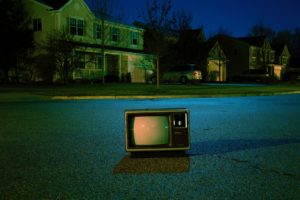
Photo by Frank Okay on Unsplash
No more NFT trading cards.
What a shame.
As I work with this exercise of imagination, I feel sad. Vision is such a miraculous gift, and beauty so nourishing. But we don’t always use it as a gift. We use it as a tool with which to make money, with which to hurt others, and with which to hurt ourselves. Most of us take our visual-oriented culture for granted and never give it a thought at all.
I also feel afraid. Our visual sense is so chaotic, so inexorable and powerful; we rely on it for most of our choices and beliefs. But vision lies. Increasingly, it misleads. AI is becoming more effective. Deep fakes are harder to spot. Advertising is ever-more powerful. And we nestle more and more deeply into the matrix, seduced and shackled to the surface of things, the presentation.
What would it be like if the world was blind? Would we then access deeper levels of our shared humanity and connection to one another?
Imagine My Surprise
Imagine my surprise,
sitting a full hour
in silent and irremediable
fear of the world,
to find the body
forgetting
its own fear the instant
it opened and placed
those unassuming hands
on life’s enduring pain,
and the world for one
moment
closed its terrifying eyes
in gratitude.
Saying,
“This is my body, I am found.”
–David Whyte
On a personal note, I’ve decided to transition to posting on Harvesting Stones biweekly rather than weekly going forward. I’ll continue to serial publish on Substack weekly.
Questions:
What is your favorite sense? Why?
What sensory input do you trust the most?
How would you feel about your body if you had never seen yourself?
How would you feel about your body if you had never seen another’s?
Leave a comment below!
To read my fiction, serially published free every week, go here:
by Jenny Rose | Nov 19, 2022 | A Flourishing Woman, The Journey
I was taught, as a child, it was my job to alleviate distress. One must always respond immediately and help the sufferer. It went far beyond duty and obligation. If I did not fix the distress of others, my childish world would fall apart. Everyone would leave.

Photo by Cristian Newman on Unsplash
For a child, such consequences are death.
I was also taught “help” meant doing anything and everything I was asked to do, immediately, unquestioningly, and unendingly. My own distress was of no consequence at best and a direct threat, an unwelcome competition, at worst.
That core teaching stayed with me as I grew up, and has been a keynote of my behavior and experience most of my life. I wanted to help people. When people around me suffered, I felt an overwhelming, painful panic, as well as complete responsibility. I had to do everything I could, give the situation my all in order to “help.”
I also grew up with an inability to respond to my own distress. Hunger, thirst, fatigue, emotional and physical pain, were all ignored. My disconnection from my own needs and experience led me into chronic pain, eating disorder, depression, and anxiety. I was unaware of my traumatic wounds. I had no interest in helping myself. Helping myself was selfish, bad, and unloving.
Then I studied emotional intelligence and all the work and therapy I’d done over the years with guides and teachers as well as on my own (see my Resources page) wove together into an intention to reclaim my health and my self.
This blog has been a key part of that work.
I still don’t like to watch people suffer, but I’m more careful now about “helping.” I’ve learned suffering is not necessarily the enemy. We get ill, have painful emotional and physical injuries, have uncomfortable feelings. We age and our bodies and sometimes our minds wear out. To be human is to experience these things; they’re inescapable. We can’t control what happens to us, but we can control how we deal with such events. When someone is suffering, I’ve learned to be less reactive, to remember it’s not my fault or my responsibility to fix it. I’ve learned to notice whether the sufferer is helping themselves before I jump in.

Photo by Joshua Earle on Unsplash
I have learned a bitter lesson: No one can help someone who will not help themselves.
I realize now we can’t always go back to where we were before we were wounded; we can’t always heal the wound itself. Sometimes our wounds and suffering are taking us into something new and what’s called for is not healing, but tolerance and patience.
What does “help” mean? This is an important question. Does help mean we respond promptly to all demands, whether or not they are safe, sustainable, or even possible? Does help mean we make thoughtful, intentional choices for safety and practicality even if those choices go against what we are being asked to do in terms of “help?” Do we decide what the best “help” is, or does the sufferer get to choose what kind of “help” they want?
I’m still uncomfortable talking about my own pain. Honestly, I’m still uncomfortable even noticing it, but I practice every day at staying present with how things are with me. It feels selfish and wrong, but I know that feeling doesn’t mean it is selfish and wrong, just that it’s very different from my early training. Sometimes the choice that feels worst is the best choice. Sometimes suffering is the only possible road forward into peace, growth and resilience.
None of us has the power to help anyone avoid suffering. I confess I’ve argued with that reality all my life, but it hasn’t done a bit of good. In fact, it’s done harm, most of all to myself.
I have occasionally, in the depths of anguish, asked for help. When I do that, what am I asking for?
Nothing tangible. Not money or a thing. Not love. Not sex. Not a gallon of ice cream. I’m not asking for someone to come along and fix it all, or take responsibility.
I’m asking to be heard. I’m asking for someone to say, “I’m here. You’re not alone. I believe in you. I know your goodness, your strength, your courage.” I’m asking for a safe place to discharge my feelings. This might involve snot, wet Kleenexes, rage, and a raised voice.
A safe place is not a place where someone else takes responsibility and fixes, or asks me to stop feeling my feelings, or is clearly uncomfortable with my suffering. A safe place is provided by someone with healthy boundaries who is willing to witness my distress without feeling compelled to fix it.
Witness. A witness. That’s ultimately what I want. Just someone to be there with me for a little while. I can face my own demons and challenges, but I can’t do it all alone.

Photo by Gemma Chua Tran on Unsplash
None of us can. We are social animals. But we can witness for one another. We can sit quietly, holding a safe space without judgment or a fix or advice, and just witness. Pass the Kleenex.
It’s the hardest thing in the world for me to do. Simply witnessing seems so passive, so weak, so useless. Someone right in front of me is deeply distressed and I simply sit like a bump on a log witnessing? Are you kidding me?
Surely, I can do better than that. I can do more than that. It’s up to me to make their suffering stop!
And yet. And yet. Isn’t finding a witness incredibly hard? How many people in our lives can take on such a role? What an inestimable gift, to be willing to walk beside someone who is suffering, to be willing to stay, to not look away. What if our boundaries were so healthy we could do that? What if we weren’t afraid of suffering? What if we were wise enough, strong enough, to make room for it and sit down beside it?
Someone I love is in great anguish of spirit. They beg me for help, but a very specific kind of help which is ethically and practically impossible for me or anyone else to give. Which makes me an enemy. Which makes my loved one even more alone than they already feel, more victimized, more powerless, more confused.
There is nothing about this that doesn’t suck. I dread the phone calls beyond words because I don’t want to witness this suffering. It feels unbearable. But my loved one must bear it, and if they have to, I can. I choose to witness. It feels like nothing. It’s not what’s wanted. But at this point it’s all I can do. So I will keep calling and answering calls. I will get up in the morning and talk to case managers, nurses, CNAs, palliative care consultants, nursing homes, and whoever else will talk to me. I will update friends and family. Then I will get up the next morning and do it again.
I pray there is some power in witnessing, some rightness. I pray that somehow my love and willingness to remain a witness does a little bit of good, provides some small comfort, lights a candle in the darkness of dementia, even for a moment.
And I search inside my own suffering for wisdom, for healing, for grace, and for faith.
To read my fiction, serially published free every week, go here:
by Jenny Rose | Nov 12, 2022 | Choice, Power
I’ve dedicated the last decade of my life to reclaiming my personal power, each step on the path made visible on this blog in the hopes that others might also find their way into a healthier, happier, more effective life.
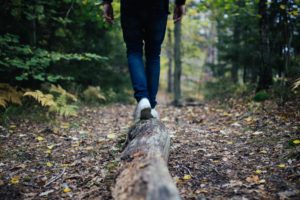
Photo by Jon Flobrant on Unsplash
It’s been an extraordinary journey, one I hope will never end as long as I’m breathing.
At the heart of personal power is our ability to choose.
I’ve always been aware of how uncomfortable I am choosing for anyone other than myself. For years I wasn’t able to choose effectively for myself; nothing in me wanted the power to choose for others. Hand-in-hand with this part of my experience is an automatic, knee-jerk stubbornness and opposition to those who try to choose for me or anyone else. It’s been a longstanding family joke: Don’t tell me what to do!
I’ve never been friendly toward this kind of authority.
As a parent I was unwilling to take on the role of a policewoman. I wanted my sons, as teenagers, to use their excellent brains and make their own choices, then deal with their own consequences. As I raised them, it slowly dawned on me the choices I made as a mom, though I always believed they were in the best interests of my sons, might have been wrong for them. I began to realize how much time we all spend in frustration over what those around us should and shouldn’t do, including our kids. I decided to stop discussing what others should choose. I still noticed the commentary in my head, but I got better at not letting it out of my mouth.
One day, I looked at my eldest son, who was going through a bad patch, and heard myself say, “I want the best for you, but I don’t know what that is.” I recognized that was the truth, and felt humbled. It broke my heart to see him struggling and unhappy. I would have done anything to have “helped.” But I didn’t trust my motives. Of course I knew what I thought he should do, but was I looking for him to feel better or for him to make me feel better? I couldn’t be sure. I just wanted things to be better. Wanted it desperately, but I also wanted him to figure out how to help himself.
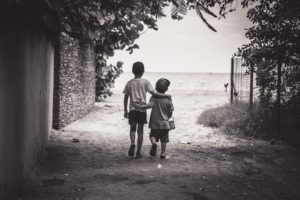
Photo by juan pablo rodriguez on Unsplash
I’m very aware of the word ‘should.’ I cut it out of my writing. I cut it out of my thoughts and speech. I’d even go so far as to say it’s a toxic word. I don’t apply it to myself and I don’t apply it to others. It never fails to appear when I’m arguing with what is or have otherwise stepped out of my own rightful power and am trying to control a situation that’s not mine to manage. It also shows up when I’m being mean to myself.
Now, suddenly, I find myself in a position of needing to make choices for a loved one who at this moment is not able to choose for themselves.
This is not like choice-making for my children. Kids are pretty resilient. I knew I would made mistakes as a parent, and I did. But I could always choose again. With small children, there’s a long future in which to reconsider, make new rules, learn in real time. I wasn’t uncomfortable with it. As they grew up, I gave them more and more power to choose for themselves and stepped back while they experienced the consequences of their choices.
Now they’re adults, and it’s harder. Now I really have nothing to say about their choices as men in the world. It’s not my business. Some of their choices are, to my mind, tragic and self-destructive, and I’m afraid for possible consequences. I’m afraid for my own pain and grief if some of those consequences occur. But I accept the only power I have is to love them and make sure they know it.
And making choices for an aging loved one is different again. The fear I’ll do it wrong is terrible. I’m working in a lifetime context where I never did do anything right, so I’m fighting that old dynamic every minute while I calmly go about gathering tools, resources and information. I know I’ll do my best and I’m confident in my own abilities and the strength of my love and intention, but choice is dynamic. It takes time to choose, observe outcomes, consider what could be better, and choose again.
I don’t know how much time I have. I don’t know how much time I want.
Working with a frail, injured, confused senior feels brittle. I may not have time to manage choice and outcome. Not only that, but when I choose for myself if I’m unhappy with the consequences I only have myself to blame; I bear all the outcomes, which is as it should be. But if we must choose for someone else, they must experience the consequences of our choice. And that’s a heavy burden for me. I feel enormous pressure to choose well, to not make anything worse, while at the same time I can’t see choices that will make anything much better.

Photo by roya ann miller on Unsplash
As I struggle with all this, mid-term elections have occurred and the final votes are being counted. The news is full of debate, discussion, and violence revolving around limiting choice and forcing “choice.” As always, I cannot get my head around people who think it’s okay to impose their ideology on others. I support freedom of personal choice (as long as it doesn’t harm others) in most circumstances. I wouldn’t impose my beliefs or choices on others. The idea is appalling. But I also don’t accept anyone has the right to restrict my access to vote or what I do with my reproductive ability. I refuse to comply with such imposition, even if it becomes law. You might as well arrest me right now.
A conversation recently took place at the pool facility where I work between a woman of child-bearing age and a male senior. She asked him why he thought it was okay for him to decide she couldn’t get an abortion when the choice was personal and had absolutely nothing to do with him. He said such a choice would hurt his feelings.
This drops my jaw. I don’t know whether to let rage catch my hair on fire or laugh. It hurts his feelings when people make choices incongruent with his belief system and ideology? Or it hurts his feelings when women are empowered? Or it hurts his feelings when he can’t control what others choose? Or he feels entitled to never have his feelings hurt?
Wow. Just wow.
Choice. It’s so easy to say to others, or to think, they should do this, or this, or the other. So easy. But I never wanted to run the world. I only wanted to be in charge of myself. Now a loved one needs me to be there for them, and I will be there every step of the way, giving it my best, just as I always have. But it’s not fun. I don’t want the power. I accept I’m the right one to have the power, but I never wanted it. How can I possibly know what’s best for another human being? How can any of us have the arrogance to think we know what’s best for everyone in every circumstance, let alone anyone in any circumstance? At times I can barely choose wisely for myself, let alone anyone else.
To read my fiction, serially published free every week, go here:


















